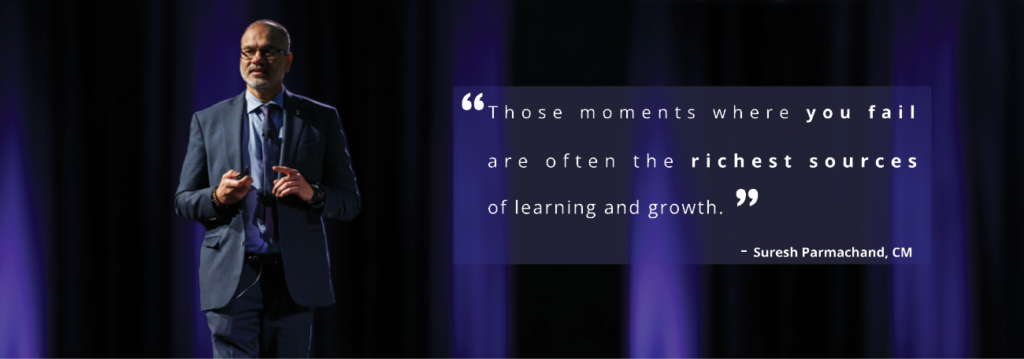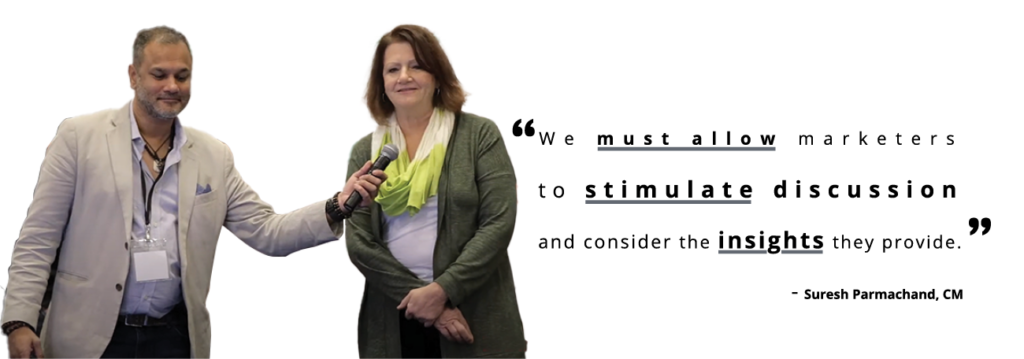
- Apr 19, 2024
- Earl DeMatas
- 0
Suresh Parmachand, CM, Director Performance Marketing at UL Solutions, describes how his passion for marketing grew from implementing the voice of the customer at Six Sigma to working with iconic brands. Suresh touches on networking, insights, adversity and why failure is essential to learning, growth and ultimately – success.
A Dynamic Community
I am so proud of being a Chartered Marketer (CM), as the CM program is a cornerstone of Canada’s marketing profession. It distinguishes itself by equipping marketers with a standardized body of knowledge that transcends the profession. The designation ensures that marketing professionals have the foundational knowledge to excel in diverse business environments. The CM program celebrates expertise and fosters a dynamic community that upholds the integrity and vitality of our field. I can wholeheartedly say that brands can confidently hire a marketing professional with a CM designation and know they will possess the marketing acumen to meet their objectives.
Meaningful Solutions
My marketing journey began as a Six Sigma as a Black Belt at General Electric. Implementing ‘voice of the customer’ into business processes enabled me to apply this knowledge in retail and wholesale sectors, differentiating GE through customer-centric strategies. I was fortunate to have been given a sales and 24 h viagra order slg.hu marketing role to support a Canadian retailer. This allowed me to lead a product launch leveraging an integrated marketing campaign approach that yielded award-winning success across various channels, which cemented my passion for marketing.
I was able to study marketing while working with some iconic brands. These experiences allowed me to showcase the importance of how strong brand narratives can impact consumer behaviour and long-term brand success. Marketing is a dynamic profession, and I wish I had understood the importance of embracing failure earlier. Those moments where you fail are often the richest sources of learning and growth.

Value and Impact
Marketing roles are complex, and I have often heard marketing referred to as a ‘thankless’ profession. Marketers convey the brand’s value across channels while working with frontline teams, clients, and other industry stakeholders to foster engagement, collaboration, building credibility and trust. These actions hopefully lead to revenue growth, but we must be thoughtful and deliberate as delivering on objectives becomes paramount to our success. When you add dynamic markets, with regular shifts and the integration and ou puis-je acheter des cialis adoption of technology, we often face imbalances as we operate during periods of growth. Our tasks seem smoother in times of market contraction as we’re tasked with maintaining the same results despite tightened budgets, This challenge underscores the resilience needed in marketing; the modern marketer must navigate the changing market forces while consistently driving value and impact for brands.
Networking, Engaging, Sharing
I stay current by networking, engaging, and sharing insights with peers and industry professionals. I try to gain knowledge wherever I can. I especially enjoy watching brand-related documentaries and understanding their origin stories, rises and falls, successes and failures. I also enjoy immersing myself in brand experiences, like visiting restaurants with my family and trying to understand why some are more successful than others, especially in a time of social media and influence. Being committed to continuous learning, this past year, I focused on AI tools, reflecting on how they can empower marketing processes and what they will mean to the future of the profession.

Consider the Insights
Marketing is constantly evolving. l have seen cycles where marketing, brand and strategy is central to the organization and instances of economic uncertainty where brands take a more reserved role. Consistently leveraging your marketing professionals’ expertise ensures they always have a voice and a seat at the strategy table. We must allow marketers to stimulate discussion through consumer and market data and consider the insights they provide. Marketing leaders must use digital and social data for real-time insights into consumer behaviour to keep up with evolving consumer trends.
Adversity Breeds Innovation
The most challenging moments in my career center around an organization’s adoption of change and usually relate to the leadership risk strategy. When our brand is not aligned with the market dynamics or position, we face the challenge of building it to compete in a disadvantaged market. In such cases, my team and I take a more creative approach. We focus on the brand elements, such as the people, partners, and the delivery of experiences. These efforts have been highly successful, thanks to many individuals’ hard work and diligence. It showcases how facing adversity could lead to innovation.
Exciting Trends
Here are four areas that will impact marketing in the near to long term:
Brands are Experiences – Brands have evolved their go-to-market approaches and moved from selling products to services, then relationships and new experiences, evident in trends showcased on social and the impact they have on consumer propensity to consume and adopt brands.
Realms of Digital, Social and Physical – Allow the digital, social, and physical domains to work together, recognizing that consumers traverse their journeys in unique ways. We must ensure the customer experience provides moments that build credibility and trust and fulfil the brand’s promise to its audiences.
Viewing Industry as an Ecosystem – Being only customer-centric may commoditize your brand, as every organization purports to be customer-centric. I believe value differentiation is created when considering the industry as an ecosystem and understanding how your brand creates value through all the actors. Recognizing that working with these same actors is the only means to co-create value in new and unique ways.

The Rise of AI –I shared the importance of the social, digital, and physical domains. That need will catalyze the adoption of AI, which will become more crucial in modern marketing to drive precision, speed, and efficiency. AI can process large data sets, assisting brands in creating personalized and cohesive experiences that build trust and keep consumers loyal.
In closing, to my marketing peers, the challenges are real; however, so too are the opportunities. Stay true to your unique brand and continue to do wonderful things.
Suresh Parmachand, CM
Director Performance Marketing at UL Solutions
Tags: Blog


